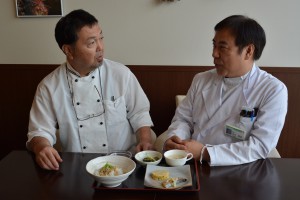The Chiba University Hospital’s high-rise restaurant is offering “yakuzen” meals using Chinese herbal medicines and locally-grown vegetables to promote the idea of “eat well to be well.”
Sakae Okabe, a chef at the restaurant Vincennes, developed recipes for the dishes based on advice from Takao Namiki, head of the hospital’s Oriental medicine department, on the effects of herbal medicines and vegetables.
The dishes are received well by customers, because they do not have the bitter taste of herbal medicines which many expect from “yakuzen” meals, according to the restaurant.

Takao Namiki (right), head of Chiba University Hospital’s Oriental medicine department, talks about healthy eating with Sakae Okabe, chef of the restaurant in the hospital.
The dishes offered at the restaurant include steamed egg rolls with bamboo shoot and spinach, and Japanese mustard spinach and Chinese yellow chive salad. The restaurant uses vegetables grown in Chiba Prefecture to promote local production for local consumption.
It also uses Chinese herbal medicines, such as jujubes which facilitate recovery from fatigue, eucommia bark which has an anti-aging effect and hawthorn which helps digestion and absorption of fats. Bitter-tasting herbal medicines are not used, under the belief that what matters is to enjoy and continue the custom of healthy eating. Around 50 people order yakuzen dishes at the restaurant every day.
Namiki says meals are important not only as a source of energy but also as a basis of health, adding seasonal foods contain many nutrients that suit the body’s needs for that time of year. He and Okabe also published a recipe book to encourage healthy eating in everyday life.
Although vegetables are locally-grown, most of the ingredients for herbal medicines are imported from China. Recently, supply of herbal medicines is becoming tight and their prices are rising due to growing demand along with the increase of wealthy people in China. Namiki says he hopes domestic production of herbal medicines will expand, because as the saying goes, “you are what you eat,” which means body and geographical environment are inseparable, and local foods suit the body most.
(June 21, 2014)

